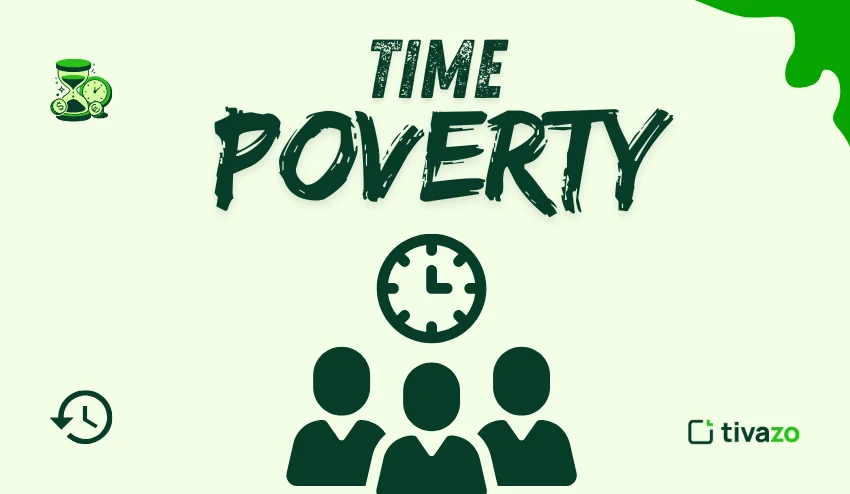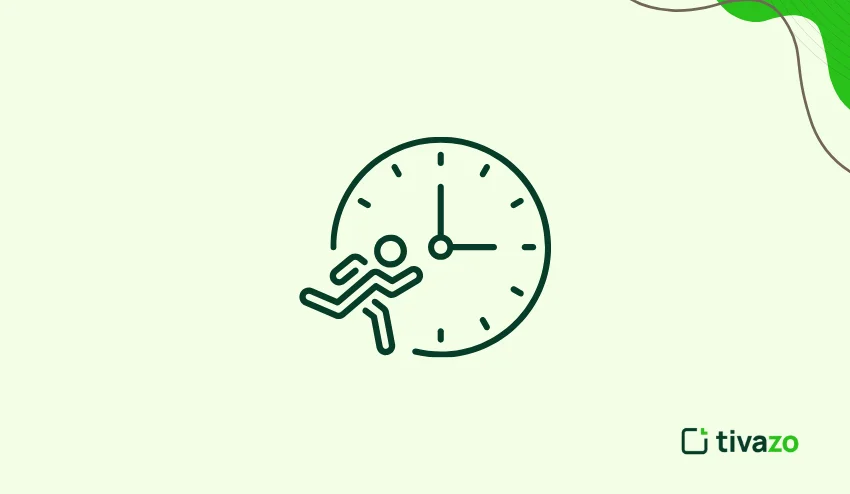In our fast-paced environment, we are now richer in technology, tools, and resources than we have ever been. But there is also a growing population of individuals and organizations struggling with time poverty. A state in which individuals simply do not have enough time to fulfill all their commitments in work, personal, and social areas of their lives. Time poverty has become a universal phenomenon and applies to both the wealthy and the working class.
Time poverty does more than limit productivity; it impacts both mental and physical health. Individuals feel that they are always behind, rushed, stressed, and fail to be unable to focus on the most important things. Understanding time poverty and mitigating its effects is vital for living a fulfilling life, both personally and professionally.
This blog will explore the concept of time poverty, including what causes time poverty and the impact it can create, as well as some real-life solutions to overcome time constraints. It could be for an individual who wants to balance their work and life, or perhaps a manager who wants to help their team work through their own time poverty issues.
What is the concept of time poverty?
Time poverty is a way of feeling when there are not enough hours in the day to complete necessary tasks and preferred activities. It doesn’t always mean being busy. It means feeling as if you don’t have control over your time.
Time-poor individuals tend to:
- Spend an exceptional amount of time on low-value activities.
- Be stretched thin from fulfilling multiple roles without making progress on anything.
- Choose work over sleep, leisure, and relationships.
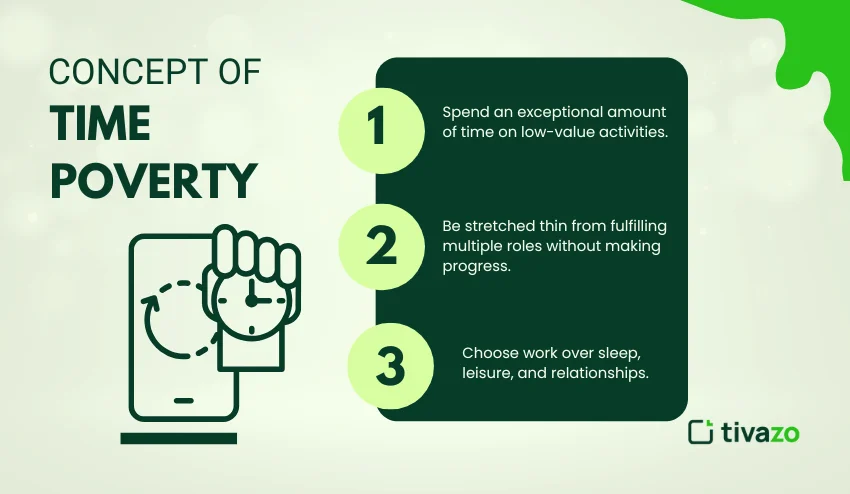
From an informational intent stance, users want to understand the simplest definition. In simple words, time poverty is when your calendar is too full, and your priorities are compromised by routine demand.
Furthermore, time poverty isn’t just related to work time. It can relate to personal life too. Someone can still feel time-poor if they aren’t able to spend hours on hobbies, self-care, or with family. When people feel that they never have enough time, it can lead to chronic stress and burnout. Poor time management can create a cycle that worsens time poverty.
In addition, time poverty frequently arises from both external demands, such as a challenging job or societal pressures, as well as internal factors like too much to do or the inability to say ‘no.’ Those who experience time poverty can feel like they are perpetually in a hurried state, ineffective at multitasking, and guilty about ‘wasting’ time resting, even when time away is in their best interests. Understanding what time poverty means and recognizing that it has become part of your life is the first step you can take to leap to take back control and live a more balanced and fulfilling life.
What Are the Reasons For Time Poverty?
Knowing the cause of time poverty will help to combat the problem. Common causes are as follows:
- Work-Related Causes – Lengthening work hours and continued digital presence lead to diminished separation between work and personal life or leisure.
- Poor time management – If individuals do not prioritize completing tasks, they can easily squander hours.
- Technology Overuse – Scrolling endlessly on social media or frequent notifications erodes time.
- Cultural/Social Norms – In some cultures, being busy is a badge of honor.
- Family/Caring Duty – Parents and caretakers face hierarchical time burdens.
- Not Delegating – Doing everything by oneself effectively cuts into personal efficiency and adds stress.
- Procrastination – Putting tasks off to the last minute creates a time cost exceeding the time saved.
- Economic – Working multiple jobs or long hours simply to make ends meet cuts into personal time.
- Overwhelming Daily Routines – Traveling to work, running errands, and chores take up ample time, and little personal time is reserved for rest and leisure.
Part of understanding time poverty from an informational research and search query perspective is to give the understanding to the understanding that time poverty is not just simply the result of an individual’s laziness – time poverty is the result of both systemic and personal time poverty causes.
Consequences of Time Poverty
The consequences of being time poor can be significant:
- Decline in Mental Health – A common response is feelings of stress, anxiety, and burnout. When you feel overwhelmed, it can lead to exhaustion and decreased resilience.
- Decline in Productive Work – Although you may feel busy all day, you may not be well-engaged or effective. Multitasking or a lack of focus may also compromise the quality of work and may even increase errors.
- Decline in Relationships – If we serve as time-poor, too little time spent with family and friends can erode our personal relationships and social support.
- Decline in Physical Health – Like other issues, not a distinct problem. Chronic sleep deprivation, poor dietary choices, and no exercise can lead to long-term health issues.
- Decline in Work Performance – Employees who are time poor are disengaged and demotivated, and more likely to turn over.
In addition to the above, time poverty reduces creativity and innovation, as we have limited time to think about ideas, brainstorm, and even think about self-care or growth activities. Over time, time poverty can also create chronic fatigue and decision fatigue, where decisions that should take little effort can take up too many cognitive resources. At the end of the day, the effects of time poverty extend beyond hours of productivity to the experiences of life and overall satisfaction.
Practical Case Studies of Time Poverty
To illustrate the concept further, in the table below, you can find some practical case studies of time poverty:
| Situation | Description | Outcome |
| Working Parent | Juggling office deadlines and parental duties | Constantly stressed and no time to recharge |
| Corporate Employee | Jumping from one meeting to another all day | No time for creative work |
| College Student | Studying, working part-time, and extracurricular activities | No time to relax or socialize |
| Entrepreneur | Running a business and staying on top of personal finances | Neglect of personal health |
These practical case studies of time poverty illustrate that time poverty affects people of all ages and walks of life, from school children to working professionals.
Dealing with Time Poverty
For readers who know they want a future action, it is important to give them concrete, actionable ways to eliminate time poverty. Here are some concrete, actionable ways to deal with time poverty effectively:
- Prioritize Tasks – Use the Eisenhower Matrix to identify urgent and important work and do the most important work first.
- Set a Boundary – Stop working too many hours after the end of a workday. I mean it! No emailing or work-related activities at home. You must protect your time away from work.
- Use Technology – Use calendars, task management tools, and automation to help you do your work more efficiently, rather than technology distracting you during work time.
- Delegate and Outsource – When you can, share the responsibilities, at work and at home, so you can save your valuable time.
- Block Time to Rest – Don’t avoid taking breaks; schedule them like you would a lunch appointment.
Each week, you should also review your commitments scheduled in your calendar to assess whether you are wasting time or doing low-impact work. Use batch processing and block time in your calendar to do low-impact work, such as responding to emails or making calls (ideally at the same time), so you can avoid unnecessary task switching. You may also want to practice mindfulness so that you can spend your time focused on one thing at a time.
In a realistic way, dealing with time poverty is a combination of managing, controlling, and proper strategic thought to develop a plan for your day and work toward achieving a greater work-life balance.
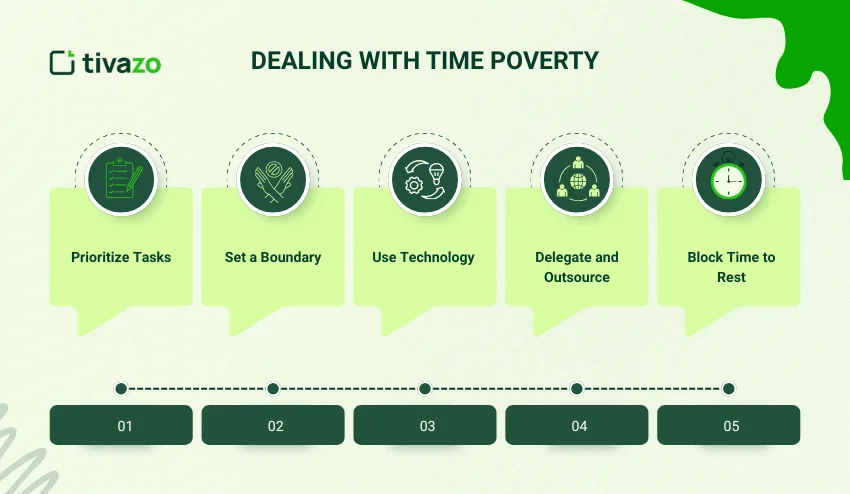
How to Confront Time Poverty
- Time Block – Allocate specific hours to focused work, which enables you to prioritize what needs your full focus and energy.
- Less is More – Remove time commitments that don’t align with what is an important use of your time. This can free up many hours!
- Automate Small Tasks – Use automated tools to take care of your bills, offload repetitive emails, and develop more automated workflow processes, which can save hours in your week.
- Learn to Say No – Withdraw from low-value activities through your self-imposed importance of the commitment you’ve made to the task and revert focus to your top priorities in the weak.
- Mindfulness – Focus on one task at a time. You’ll not only be more productive and satisfied, but you will feel more in control of your day.
It will take practice and discipline to alleviate time poverty, but prioritizing value commitments and habits that will re-establish your focus on your time is important in proposing ahead and becoming intentional while making daily habits that are not usually addressed and can be the most helpful to growing your effectiveness and productivity.
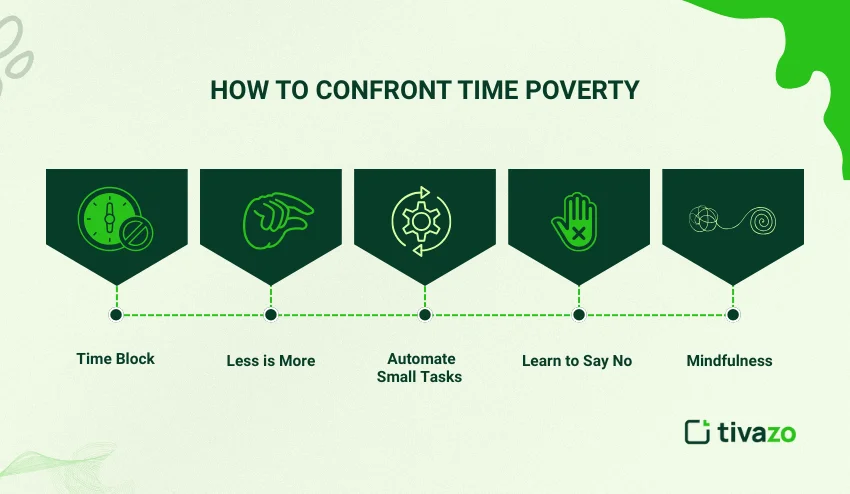
Ways to Be Time Rich
- Preparation – Look ahead to your week, anticipate pitfalls, and prioritise tasks at the right moment to minimize last-minute stress.
- Say No to Multitasking – Remove the tendency to multitask and particularly focus on one task at a time, which will support productivity and reduce cognitive overload.
- Take Care of yourself – Have healthy amounts of sleep, nutrition, and increase physical activity to extend sustained attention and performance.
- Establish Support Systems – Utilize childcare, workplace policies, or flexibility, and/or task sharing to reduce the burden of time.
- Evaluate – Ongoing evaluation of your calendar and habits when you experience “time leaks” in your calendar and adjust accordingly.
- Engage with Intention – Begin to incorporate these steps regularly in order to live with time abundance and great work-life balance.
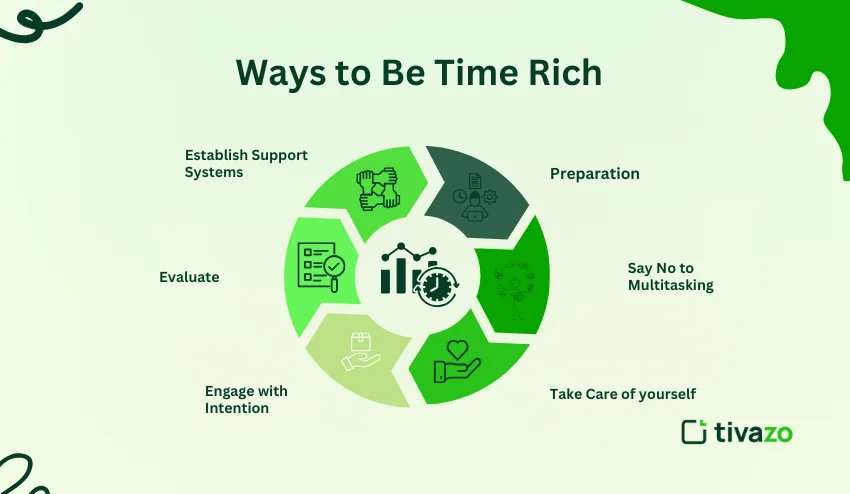
Conclusion
Time poverty is not just a personal frustration; it’s a broader dilemma affecting our productivity, our relationships, and our overall well-being. Once we recognize time poverty’s causes and consequences, we can more readily and thoughtfully move to implementing practices and habits to combat it.
So, whether you are trying to learn about time poverty, thinking about leveraging ways to mitigate it, or simply looking for some credible sources, this space aims to provide you with a range of background information, applicable tools, and useful tips to help you reclaim your time, improve your attention, and inspire a healthier life, work/life balance.
